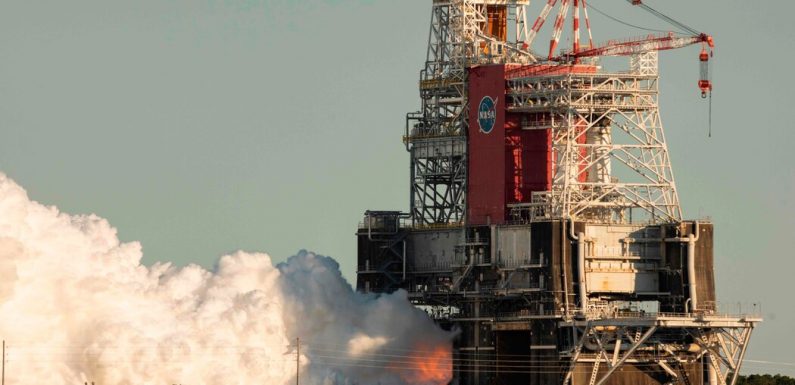
A critical piece of NASA’s giant moon rocket is in good shape even after a test firing on Saturday was abruptly cut short after just over a minute, space agency officials said on Tuesday.
The officials said it was too early to say whether the test — simulating the firing of the four engines for eight minutes during an ascent to orbit — would need to be repeated. If engineers determine they have learned enough and can skip a second test, NASA would proceed to shipping the booster stage of what is called the Space Launch System to the Kennedy Space Center in Florida.
“It’s premature right now to say which direction we’ll go,” John Shannon, the program manager for the rocket at Boeing, said during a news conference on Tuesday. Boeing built the booster, which is often referred to as the core stage.
An uncrewed test launch is currently scheduled for November, and Kathy Lueders, the associate administrator for human exploration and operations at NASA, did not rule out the possibility that the launch of the rocket, known as the Space Launch System, would still occur in 2021. The program is years behind schedule and has cost billions of dollars to get this far. Each rocket could cost $2 billion to launch and can only be used once.
The early shutdown of the engines was caused by low hydraulic pressure in a component called the auxiliary power unit. Because the booster stage in the test is the same one that would be launched into space, engineers were particularly careful to make sure it would not be damaged during the test. If the same thing had occurred during a flight, the engines would not have been shut down.
“We would have continued to fly after encountering the condition that we saw on the test,” said John Honeycutt, the program manager for the rocket program at NASA.
Another problem that occurred during the test — what was described as a “major component failure” on one of the engines — turned out to be an issue with a sensor that did not play a part in the test shutdown. Inspections afterward indicated that all four engines were in good shape.
However, NASA and Boeing engineers now face two less-than-perfect options. They could repeat the test — perhaps a shorter one — to collect the remaining data. But there is always a risk that something will go wrong during a test. Or the engineers could decide that they have enough information and move it to Florida.
“This is our flight core stage,” Ms. Lueders said. “So you have to understand what’s the risk of exposing the flight core stage to another round of tests.”
For Jim Bridenstine, the NASA administrator, Tuesday was his last full day on the job. He will step down on Wednesday when President-elect Joseph R. Biden Jr. is inaugurated.
Unlike the turmoil in the final days of many corners of President Trump’s administration, Mr. Bridenstine emphasized the importance of continuity and said NASA had the support of both Republicans and Democrats.
“It should never be partisan,” Mr. Bridenstine said. “It should always be uniting. It should bring people together for science and discovery and exploration.”
Mr. Trump did not always agree, at times taking inaccurate swipes at the Obama administration’s space policy while his administration set a goal of having astronauts return to the moon by 2024. But that seemed out of reach even before Mr. Trump lost re-election, as Congress did not provide as much financing as requested for the development of the landers to take astronauts to the lunar surface.
Mr. Bridenstine said NASA was figuring out whether the Trump administration’s plans needed to be adjusted.
“I have no doubt that the amazing people at NASA are going to present a range of options for our return to the moon that the next administration can fully buy into and support,” he said.
Mr. Biden has not yet named whom he will nominate to be the next NASA administrator, but Mr. Bridenstine pledged support.
“Now I get I get to watch it as a taxpayer, and not as the head of the agency,” he said. “But I will be watching with great interest and certainly cheering for you all along the way.”
Sync your calendar with the solar system
Never miss an eclipse, a meteor shower, a rocket launch or any other astronomical and space event that's out of this world.
Exploring the Solar System
A guide to the spacecraft beyond Earth’s orbit.
Source: Read Full Article

